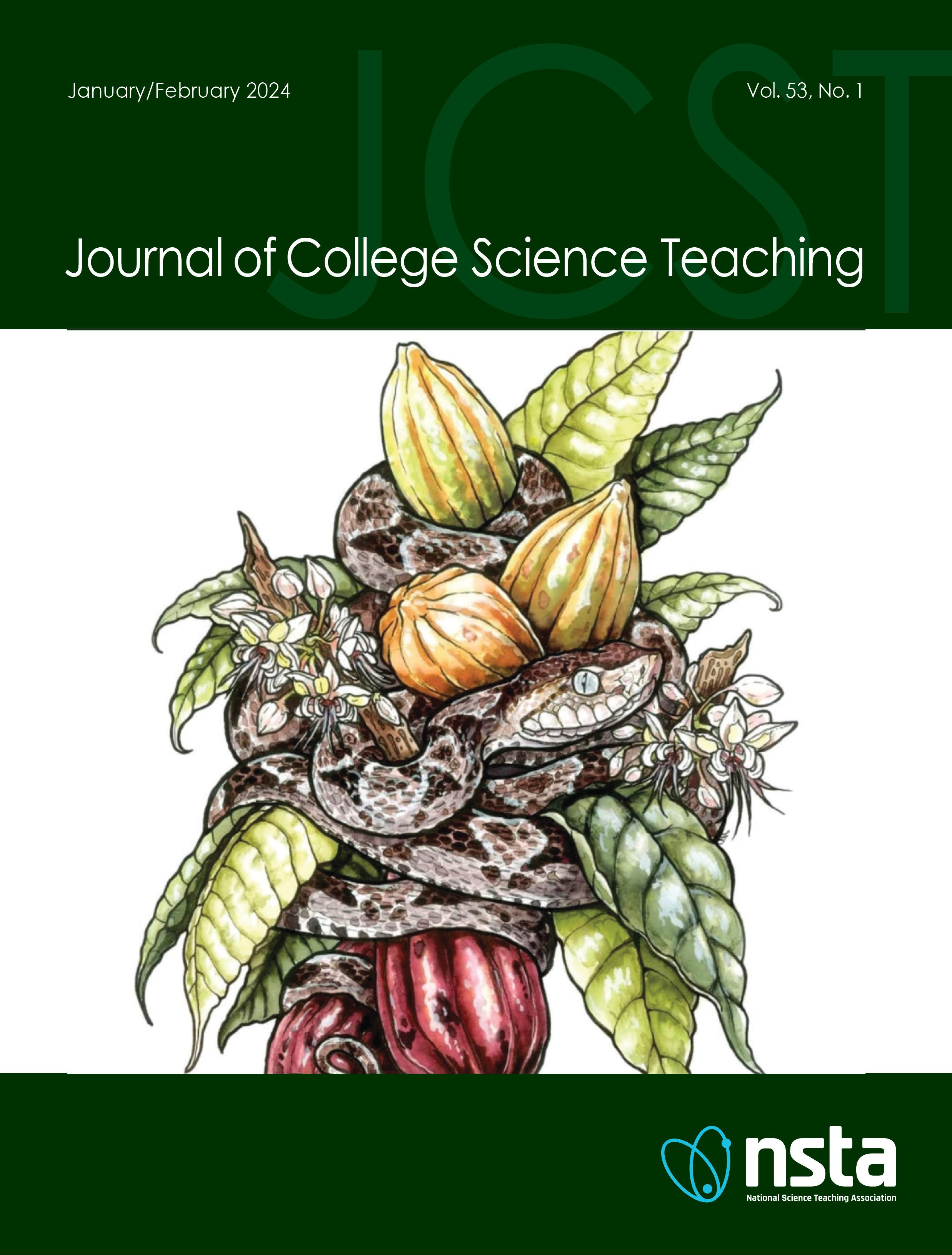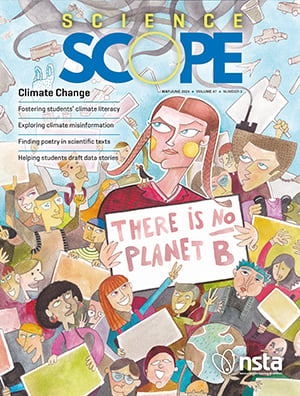All Resources
Journal Article
Collaborative Learning and Andy Weir’s Project Hail Mary
Editor's Corner...
By Ann Haley Mackenzie
Journal Article
Fostering Inclusive Collaboration: Strategies to Disrupt Inequities in Student Groupwork
This paper examines challenges in student groupwork, emphasizing the impact of collaborative learning dynamics on outcomes. Addressing uneven participation and unintentional exclusion, it explores nuanced aspects of perceived student status, revealin...
By Anna Karina Monteiro, Michele Cheyne, and Lauren Kline
Journal Article
Group Learning Routines as a tool to build equitable learning experiences in a Biology classroom
The vision behind the Next Generation Science Standards (NGSS) is that all students engage in explaining phenomena and designing solutions with three-dimensional learning. Authentic sensemaking involves opportunities for learners to share, analyze, a...
By Elizabeth Chatham, Joy Otibu, and Andrea Sau
Journal Article
Early Retirement: Making Sense of Patterns in Historical Data of Retired Hurricanes
Long after a hurricane passes over and through any region or coastal area, the memories of it often linger. There may be visual reminders of the storm and the day lives may have been changed, or lost, forever. Hurricanes can be long-lived storms. The...
By Christopher Roemmele, Joby Hilliker, and Victoria Clayton
Journal Article
This lesson allows students to engage in sense-making through the cross-cutting analysis of the form and function of pollen, carried by pollinators. Students observe the microscopic features of pollen and how insects transport these fine, but critica...
By Laura Wheeler, Rita Hagevik, and Kathy Cabe Trundle
Journal Article
Constructive student roles for authentic collaboration in engineering design challenges
Student roles can promote collaboration and individual accountability in groups during engineering design challenges. However, student disengagement may occur if students do not perceive value in their roles. We introduce four distinct roles—qualit...
By Andrew Kipp and Gustavo Perez
Journal Article
Two modules were designed for high school science students to investigate the performance of a rain garden installed on school property. The rain garden, a green infrastructure system which allows soil infiltration, was installed to reduce impacts to...
By Lauren Brase, Robert Ford, Amy Parker, Heather Mayfield, Adam Lehmann, and Sarah Meadows
Journal Article
Talk it Out! Creating an Inclusive Learning Environment with Dialogues
Getting ALL students involved in a class can be a difficult task. Getting students EXCITED about reading, writing, and learning can be an even MORE difficult task. Fortunately, the use of Dialogues is an easy strategy that any teacher can implement...
By Anne Levendusky and Gregory Bisbee
Journal Article
Using Collaborative Digital Summary Tables to Impact Student Engagement and Learning
This manuscript reports on the impact of using collaborative digital summary tables on student engagement and learning. First, traditional summary tables were used during two units in 7th grade life science, then more scaffolded digital collaborative...
By Grace Buchholz and Pradeep Maxwell Dass
Journal Article
Blackout Poetry: Eclipsing with words and images to Illuminate ideas
Integrating literacy practices in science classrooms can help students with reading complex scientific text, write arguments as part of shared cross-disciplinary practices and engage with content. In the Linking Science, Mathematics, and Literacy fo...
By Amy Lannin, Jeannie Sneller, and Heba Abdelnaby
Journal Article
Easing into Socioscientific Issues and Critical Science Literacy
Including SSIs in the classroom can be a daunting task. To make this task more manageable, we have developed a strategy to easily create short modules for use in our classrooms that can be used to introduce new topics or apply previously learned topi...
By Mitchell Klocke and Jerrid W. Kruse
Journal Article
Empowering Student Action Through Climate Literacy Development
In light of the International Panel on Climate Change's findings, this article underscores the detrimental effects of climate misinformation in the U.S. and its role in impeding public understanding and action. Leveraging the power of education, an 8...
By Jocelyn Miller, Gina Childers, and Rebecca Hite
Journal Article
Engineering activities often emphasize the practices of engineers, but can sometimes feel disconnected from content. This engineering design activity ties together multiple Next Generation Science Standards (NGSS) and explicitly addresses the nature ...
By Isaiah J. Kent-Schneider, Bridgid Miller, Emma Marie, Jayme Scheck, Jerrid Kruse, and Dan Chibnall
Journal Article
Exploring Climate Change through Students’ Place Connections and Public Data Sets
Climate change is a pressing societal challenge. It is also a pedagogical challenge and a worldwide phenomenon, whose local impacts vary across different locations. Climate change reflects global inequity; communities that contribute most to emission...
By Kathryn Lanouette, Krista Cortes, Lisette Lopez, Michael Bakal, Michelle Wilkerson
Journal Article
Undergraduate institutions serve as stepping stones to a student’s career. Teaching and learning in the science classrooms requires quality and integrated teaching-research learning experiences that prepare students to advance their careers. Using ...
By Aditi Sengupta, Nallely Delara, Joyce Barahona, and Justin Garcia
Journal Article
A Residential Learning Community for Enhancing STEM Education: Program Design and Lessons Learned
There continues to be a concern regarding sustained recruitment and retention of students in STEM majors. Although the rate of attrition in these majors is comparable to other majors (Chen, 2013), the demand for trained scientists to enter the workfo...
By Jessica M. Fautch
Journal Article
Application of retesting as a learning tool in an online science course
Retrieval practice has been proved effective in conceptual science learning and retesting was applied in retrieval practice and showed significant improvement in learning outcomes (Karpicke & Blunt, 2011; Ariel et al., 2018; Lyle et al., 2020). In th...
By Qunxing Ding and Haiyan Zhu
Journal Article
Nationally, students fail anatomy and physiology courses at some of the highest rates compared to other courses at the undergraduate level. Formative evaluation guides future learning by assessing the quality of student achievement while the student ...
By Amy Benton and Drew Hataway
Journal Article
Moving to remote, online learning to meet local and national health guidelines during the COVID-19 pandemic posed a challenge for college science courses due to the interactive nature of laboratories. We developed and implemented a remote/in-person l...
By Matthew Lundquist and Ann Aguanno
Journal Article
Most introductory science courses are large, lecture-style general education classes. Introduction to Environmental Science (ES 100) at NC State University is no exception, enrolling 200-300 students and meeting in the campus cinema. In 2018, I intro...
By Stephanie Jeffries
Journal Article
In this article, we discuss Micro Assignment Guided Inquiry and Collaboration (MAGIC), an active learning method that draws on the merits of inquiry-based learning in STEM courses. We describe the use of Micro Assignments (MAs) consisting of a serie...
By R.F. Malenda, S. Talbott, and Scott Walck
Journal Article
Equitable sensemaking enables students to draw on personal resources to investigate and explain phenomena and problems within their communities. Although equitable sensemaking allows for meaningful understanding of big ideas of science and deeper eng...
By Jessica Stephenson Reaves and Anna Arias
Journal Article
Undergraduate Student Perceptions of Online Teamwork Activities during the COVID-19 Pandemic
During the COVID-19 pandemic, it was suddenly necessary to shift college courses online. Many instructors without experience teaching online were faced with course design decisions about how to structure their courses and support students during the ...
By Tracy Ediger, Olga Glebova, Michael Waterson, and Matthew Nusnbaum
Journal Article
Authentic assessments for an in-person or online science course for pre-service teachers
Creating authentic science assessments that engage students in conceptual understanding and provide evidence of their learning is challenging. Student-centered instruction and assessments provide an opportunity to build student agency and foster posi...
By Stefany M. Sit and Laura Zeller
Journal Article
Course-based undergraduate research experiences (CUREs) increase student engagement in scientific practices and allow students to generate novel findings. Previous studies demonstrated that CUREs are more effective at enhancing students’ motivation...
By Ginger R. Fisher, Kevin W. Floyd, and Jeffrey T. Olimpo
Journal Article
Communicating scientific findings is an accepted part of the research experience, but few science programs include explicit undergraduate curricula for developing or practicing oral science communication. Course-based undergraduate research experienc...
By E. Austin Leone and Donald P. French
Journal Article
An introductory physics course may be run like a video game, where students have an almost unlimited number of attempts to demonstrate their competencies through a sequence of zero-penalty assessments until the end of a semester. Each checkpoint is ...
By Minjoon Kouh
Web Seminar
Archive: SP24: Health DataWell: HS Life Science Instructional Materials, June 4, 2024
Health Datawell provides free lesson plans and storyline units to help high school students understand the varied roles of citizens and health scientists in protecting and promoting the health and wellness of their communities. These instructional ma...
Web Seminar
Did you come up with an innovative way to teach a lesson? Have you devoted your life to promoting science and the teaching of science? Did you successfully transform science teaching in your classroom? If you answered yes to any of these questions, t...
Web Seminar
Archive: Nominations – Leadership Opportunities for Members, September 19, 2024
Question…What do you think the “face of success” looks like? We think it looks like YOU volunteering your time, providing your viewpoints, and applying your experiences....
Web Seminar
Archive: Science Update: Get Ready for International Observe the Moon Night! July 11, 2024
During this seminar, the presenters will share updates on NASA's lunar science and exploration program, and Artemis missions.You’ll also discover how you can continue learning about the Moon through International Observe the Moon Night, an annual p...
Journal





